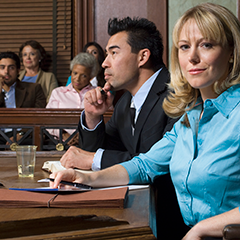What Should You Expect in an Expert
January 5, 2018 | Valuations
 When choosing financial expert for a litigation matter, recommendations from other attorneys or reputation along are often the deciding factor. But even if an expert is known as the best expert in their particular area, they may not be a good fit for every attorney. It makes sense for an engaging attorney to interview the expert, in person if possible, before signing the engagement letter.
When choosing financial expert for a litigation matter, recommendations from other attorneys or reputation along are often the deciding factor. But even if an expert is known as the best expert in their particular area, they may not be a good fit for every attorney. It makes sense for an engaging attorney to interview the expert, in person if possible, before signing the engagement letter.
There are also other matters an attorney should explore before choosing a financial expert:
- Competency. Is the expert qualified to perform the engagement for which they are being considered? Competency implies both specialized knowledge and skills, including knowledge of the subject matter involved in the litigation. The expert needs to be able to apply their knowledge in order to form and support opinions. The engaging attorney should determine the expert’s level of competency through interviews, references.
- Diligence. The financial expert should exercise due diligence and due care. Failure to do so can lead to exclusion of their testimony, and possible to the loss of the case completely. The expert should have a reputation for thoroughness and care in performing an engagement. Attorney can ask for a list of cases where the expert has previously testified, and avoid those that have performed poorly.
- Ethics. Honesty and integrity are critical. An attorney might have to rely on references for this, but interviewing the expert in person can help gain some inferences of these traits.
- Testifying ability. Use part of the pre-engagement interview to assess the expert’s testifying ability. They need strong verbal skills and the ability to remain cool under pressure. Interview potential experts using a style similar to how it will actually be in the courtroom. If the testifying styles of the expert and the attorney are not a good fit, the assisting attorney might want to better match the style of the potential expert.
- Collaboration. Once the expert is on board, it is critical that the attorney and the expert work closely together. The expert should be continuously informed about the status of the case, and vice versa. The expert has to be helpful to the attorney in defining what is needed.
A good expert wants to be engaged in a thoughtful and thorough manner. Often, when an expert is thrown in at the last minute, the engagement turns out to be a poor fit. If possible, the attorney should plan enough in advance so that a thorough investigation of these factors can be carried out before engaging a financial expert.
Contact Filler & Associates for more information about expert financial testimony.
